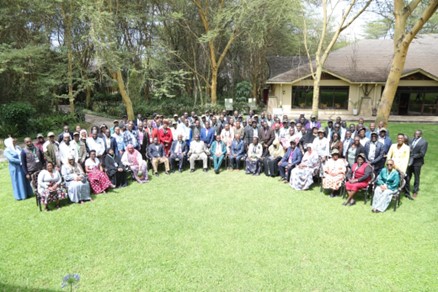
(Naivasha, Kenya–November 26, 2024). Faith leaders from diverse denominations and faiths convened in Naivasha in November 2024 for an insightful dialogue with agricultural biotechnology experts during the Faith Leaders Agricultural Conference.
The conference, discussed the role of modern agricultural technologies, including biotechnology, in enhancing food production and the livelihoods of Kenya’s smallholder farmers.
Religious leaders, researchers, and government officials sought to gain a common understanding and develop joint support for innovative agricultural solutions. The participants discussed how modern technologies, particularly genetically modified organisms (GMOs), can mitigate challenges such as climate change, emerging pests and diseases, and declining soil fertility.
Speaking at the event, AATF Senior Manager, Policy and Regulatory Affairs, Dr Francis Nang’ayo, highlighted the critical role of science, technology and innovation (STI) and how they can be responsibly and safely harnessed to address pressing agricultural challenges. He noted the environmental and economic benefits of technologies such as GM cotton, which reduce the need for chemical pesticides and the role of technology in improving yields sustainably.
Persistent misconceptions and skepticism continue to surround GMOs in Sub-Saharan Africa, hindering their adoption in the continent despite proven benefits. Environmental conservationist Mukhtaria Gulshan from Marsabit County, Kenya, who previously opposed GMOs, shared his transformation after participating in the conference. “I realized my doubts were based on misinformation. Seeing the GMO process firsthand has changed my perspective,” he said. “GMO crops are just like any other plants. This is the way to go for sustainable agriculture.”
Reverend John Alusiola emphasized the importance of informed discourse to equip faith leaders to educate communities on the safety and benefits of biotechnology.
AATF’s Open Forum for Agricultural Biotechnology (OFAB) Project Manager Vitumbiko Chinoko said biotechnology can play a transformative role by offering solutions across the agricultural value chain, from improved inputs to post-harvest resilience.
Vitumbiko noted that despite its vast resources, Africa lags in agricultural innovation, recording the lowest global investments in research and development, agricultural mechanization, and fertilizer use. Africa also faces significant food security challenges, compounded by climate change and underdeveloped infrastructure.
National Muslims Forum Coordinator Salim Charo stressed the urgency of Africa’s farmers adopting modern agricultural practices in light of climate change and nutrient-depleted soils. “Technology, including biotechnology, is vital for improving crop yields and achieving food security. Embracing technology conforms with historical agricultural practices and does not conflict with religious teaching”
…….Ends……
About AATF (www.aatf-africa.org)
Founded in 2003 to address Africa’s food security prospects through agricultural technology, AATF believes that the agricultural sector is a key foundational pillar as Africa consolidates its economic growth and carves out its new position as a major global economic powerhouse and the next growth market in the world. It was formed in response to the need for an effective mechanism that would facilitate and support negotiation for technology access and delivery and formation of appropriate partnerships to manage the development & deployment of innovative technologies for use by smallholder farmers in SSA.
For more information contact:
Mr Verenardo Meeme, OFAB Africa Programme Officer at AATF. Email address v.meeme@aatf-africa.org, Mobile: +254110597670


















































































